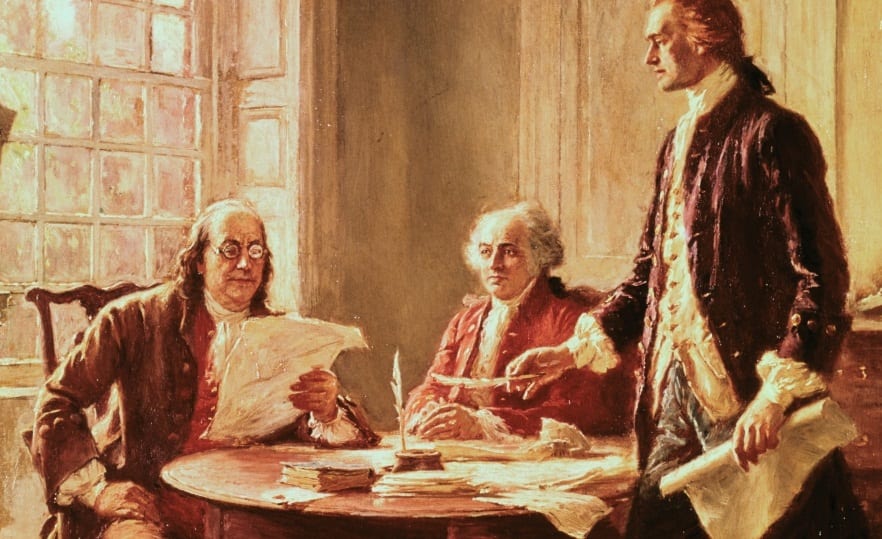
Native Lessons: What They Don’t Teach You In School About The Persian Empire
I’ll get straight to the point ↓
America’s Founding Fathers based much of the constitution on the ideals of the Persian Empire.
To begin → I should mention that my education started in Germany, which means my base was foreign. A big reason for my wide perspective and I love it!
After moving to the US, I started recognizing the difference in the teaching systems. In school, we learned a lot about America and its birth. In America we focused more on the accomplishments. Stories of battles won, villains defeated, and more. But what they didn’t tell me is …
Jefferson, Franklin, and the rest our Founding Fathers based A LOT of their thoughts on King Cyrus’ ideologies when writing the US Constitution.
They don’t tell you about how our American Founding Fathers were highly influenced by the social structures created by one of Persia’s most important kings — Cyrus the Great. Founder of the Achaemenid Empire aka the Persian Empire. Their social structure was the earliest known successful democracy that supported religious freedoms.
They learned about Cyrus through a book written a century after his death, Xenophon’s Cyropaedia. In this book it brings to light Cyrus’ Cylinder — a collection of his methods in governing a large empire — also referred to as “the first declaration of human rights.”
The tolerance shown by Cyrus toward diverse religions and cultures was a historical first.
— Ancient Persian Ruler Influenced Thomas Jefferson, U.S. Democracy by Lea Terhune
The Persian Empire is among the strongest, and most influential in the history of the world. The first true empire that set the standard of what it meant to rule one. Cyrus the Great was notable for conquering various civilizations extending from the Balkans and Eastern Europe to the Indus Valley. More importantly, uniting them.
The US embassy recognizes Cyrus for creating an efficient bureaucracy to oversee disparate cultures within his vast empire and governed with tolerance that evoked admiration in the ancient world.
Jefferson who possessed two editions of the Cyropaedia features Greek and Latin parallel texts on facing pages. A quote from Jefferson, taken from a letter to his grandson Francis Wayles Eppes;
… I would advise you to undertake a regular course of History and Poetry in both languages. In Greek, go first thro’ the Cyropaedia, and then read Herodotus, Thucydides, Xenophon’s Hellenus and Anabasis …
Jefferson was also highly influenced by the Scottish Enlightenment — Scottish intellectuals referred to the accounts of Cyrus in their efforts to sort out the “pressing question of church and state.” Something our very own Founding Fathers had to face.
One revelation of the Cyrus Cylinder exhibition, according to British Museum Director Neil MacGregor is notes that the importance of Cyrus to those who wrote the Constitution of the United States….
The story of Persia — Iran — is part of the story of modern United States.
He said that although 18th-century Europeans read and commented on the tenets of religious freedom and tolerance set down by Cyrus, only the United States’ founders enshrined them in law.
I am a Persian rooted girl whose proudly also a US citizen. My educational studies are in journalism and I’m very aware of the power of media.
Most countries seem to be looking down at Iran and its beloved Persian culture. But remember this my doosts → Over the past five thousand years, many empires and dynasties have come and gone; yet, the people of Persia are still a large and proud population. The United States has been built to endure as well.
The Things You Didn’t Know About Persia & Our Roots
- Their successful model of a centralized, bureaucratic administration jumpstarted the concept of empires in places like Greece and India.
- For building infrastructure such as a postal system and road systems.
- Because of their rule over big lands, they also established the use of an official language across all its territories.
- Their large professional army and civil services which inspired similar systems in later empires.
- Noted in Western history as the antagonist of the Greek city states during the Greco-Persian Wars and for the emancipation of the Jewish exiles in Babylon.
It is equally notable for:
- The Persian Empire dominated most of the Middle East and ruled over a greater percentage of the world’s population than any other empire in history.
- Due to their large population of approximately 49.4 million people in 480 B.C. — the Persian Empire was 44 % of the global population at that time.
- As a result, the first empire to connect multiple world regions, including the Middle East, North Africa, Central Asia, India, Europe, and the Mediterranean world.
In addition, many would even describe the Persian Empire to have ruled through its dynasties even after Alexander the Great took over in 330 B.C.
… yeah we’re pretty badass like that.
It’s time we learn MORE about the rest of the world too.












[…] the Persian New Year, is a celebration of spring that dates back over 3,000 years, rooted in the ancient […]